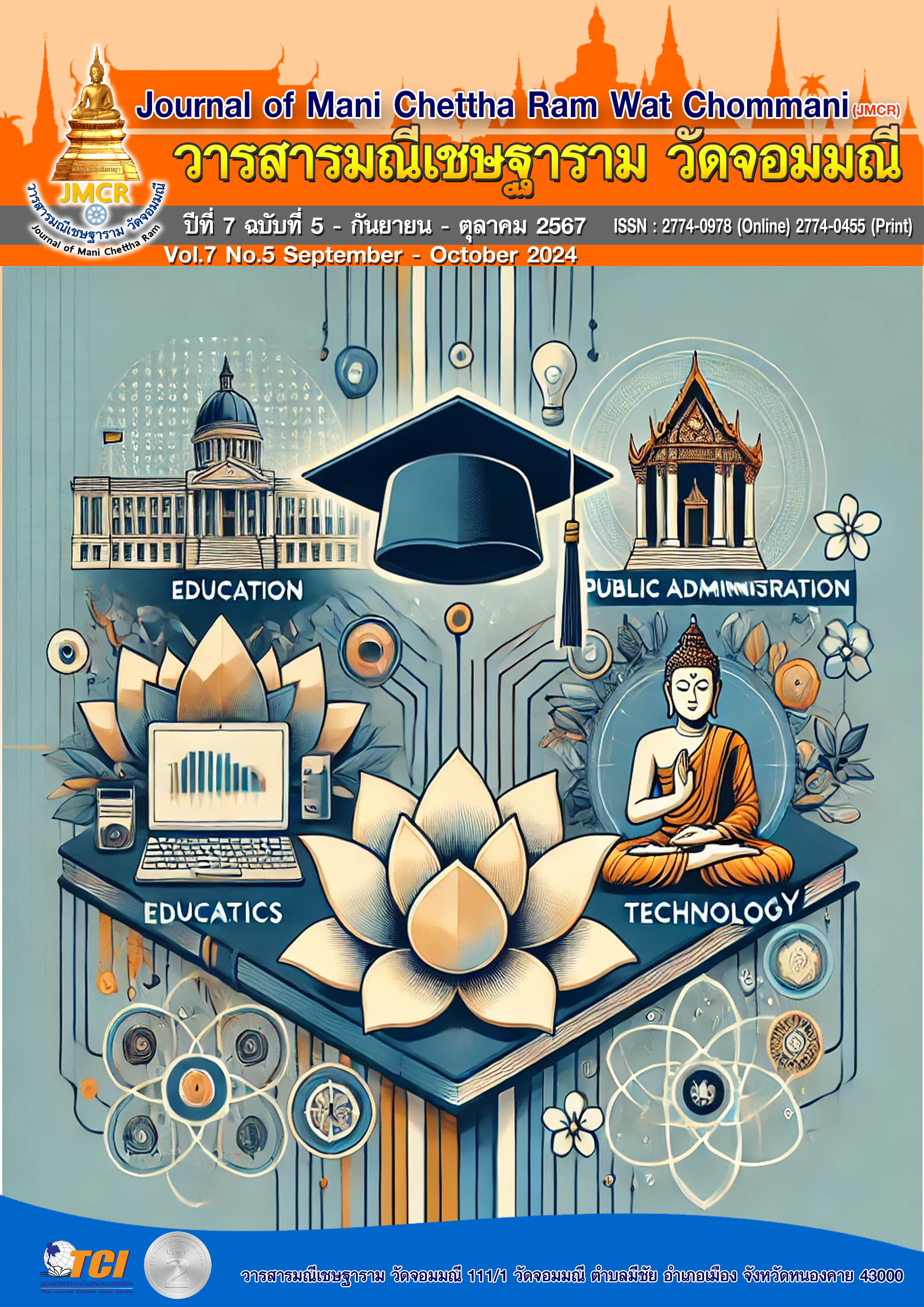THE DEVELOPING A TRAINING CURRICULUM TO ENHANCE PROACTIVE COMPETENCY BASED LEARNING USING GUIDANCE AND MENTORING PROCESSES FOR TEACHERS UNDER LOPBURI PRIMARY EDUCATIONAL SERVICE AREA OFFICE 1
Keywords:
Training curriculum, Competency-based learning management, Coaching and mentoringAbstract
This research aimed to: 1) Study the essential background information necessary for developing a training curriculum to enhance proactive competency-based learning management through mentoring and coaching processes.2) Develop and evaluate the quality of the training curriculum aimed at enhancing proactive competency-based learning management through mentoring and coaching processes.3) Implement the training curriculum designed to enhance proactive competency-based learning management through mentoring and coaching processes. 4)Assess the training curriculum aimed at enhancing proactive competency-based learning management through mentoring and coaching processes. The target group consisted of 30 volunteer elementary school teachers. The research tools included the training curriculum, a knowledge test, an assessment form for the ability to design proactive competency-based learning management, and a feedback form for teachers' opinions on the curriculum. Data were analyzed using mean, standard deviation, content analysis, and One Sample t-test statistics.
The research found that: 1)The study of the basic information of the training program revealed that the program is designed to enhance teachers' knowledge, skills, and characteristics according to their competencies in designing proactive competency-based learning management. This is achieved through the use of mentoring and coaching processes, providing guidance and facilitating work in educational institutions. 2) The results of developing and evaluating the quality of the training program aimed at enhancing proactive competency-based learning management using mentoring and coaching processes indicated that the program was overall highly appropriate ( = 4.50, S.D. = 0.17) The pilot study showed that the program is feasible for implementation. 3) After implementing the training program to enhance proactive competency-based learning management using mentoring and coaching processes, teachers under the Office of Lopburi Primary Educational Service Area 1 demonstrated knowledge and the ability to design learning management above the 75% benchmark. 4)The evaluation of teachers' opinions on the training program in terms of input factors, processes, and outputs found that overall, teachers rated the program highly ( = 4.43, S.D. = 0.17)
References
กิติชัย แสนสุวรรณ. (2561). การพัฒนาหลักสูตรฝึกอบรมสมรรถนะการวิจัย ของครูพลศึกษาระดับมัธยมศึกษา จังหวัดมหาสารคาม. ใน วิทยานิพนธ์ ปรัชญาดุษฎีบัณฑิต วิจัยและพัฒนาหลักสูตร. มหาวิทยาลัยราชภัฏมหาสารคาม.
คณะกรรมการอิสระเพื่อการปฏิรูปการศึกษา. (2562). รายงานเฉพาะเรื่องที่ 12 หลักสูตรและการเรียนการสอนฐานสมรรถนะ. กรุงเทพมหานคร: สำนักงานเลขาธิการ คณะกรรมการอิสระเพื่อการปฎิรูปการศึกษา.
ทิศนา แขมมณี. (2545). ศาสตร์การสอน: องค์ความรู้เพื่อการจัดกระบวนการเรียนรู้ที่มีประสิทธิภาพ. กรุงเทพมหานคร: ด่านสุทธาการพิมพ์.
ทองฟู ชินะโชติ. (2540). การฝึกอบรมกับการพัฒนาบุคลากร. กรุงเทพมหานคร: ภาควิชาบริหารธุรกิจ คณะรัฐศาสตร์และบริหารธุรกิจ มหาวิทยาลัยเกษตรศาสตร์.
ธารทิพย์ นรังศิยา. (2559). การวิเคราะห์โมเดลเชิงสาเหตุของความสำเร็จของการชี้แนะและการเป็นพี่เลี้ยงครู. วารสารอิเล็กทรอนิกส์ทางการศึกษา, 11(2), 235-250.
ยศวัฒน์ คำภู. (2562). การพัฒนาครูในการจัดการเรียนรู้แบบฐานสมรรถนะโดยใช้โครงงานเป็นฐาน วิทยาลัยการอาชีพพรรณานิคม สังกัดสำนักงานคณะกรรมการการอาชีวศึกษา. ใน วิทยานิพนธ์ครุศาสตรมหาบัณฑิต สาขาวิชาการบริหารการศึกษา. มหาวิทยาลัยราชภัฏสกลนคร.
รุจิร์ ภู่สาระ. (2551). การพัฒนาหลักสูตร:ตามแนวปฏิรูปการศึกษา. (พิมพ์ครั้งที่ 3). กรุงเทพมหานคร: บุ๊คพอยท์.
ศุภวรรณ สัจจพิบูล. (2560). แนวคิดการนิเทศเพื่อพัฒนาสมรรถนะการจัดการเรียนรู้ในศตวรรษที่ 21.วารสารมหาวิทยาลัยศิลปากร ฉบับภาษาไทย สาขาสังคมศาสตร์ มนุษยศาสตร์ และศิลปะ, 37(1), 203-222.
สำนักงานคณะกรรมการการศึกษาแห่งชาติ. (2553). พระราชบัญญัติการศึกษาแห่งชาติ พ.ศ.2542 และที่แก้ไขเพิ่มเติม (ฉบับที่ 3) พ.ศ. 2533.กรุงเทพมหานคร: สำนักนายกรัฐมนตรี.
สำนักงานเลขาธิการสภาการศึกษา กระทรวงศึกษาธิการ. (2560). แผนการศึกษาแห่งชาติ พ.ศ. 2560–2579. กรุงเทพมหานคร: พริกหวานกราฟฟิค.
สำนักงานเลขาธิการสภาการศึกษา.(2562). แนวทางการพัฒนาสมรรถนะผู้เรียนระดับการศึกษาขั้นพื้นฐาน. นนทบุรี: บริษัท 21 เซ็นจูรี่ จำกัด.
สำนักงานเลขาธิการสภาการศึกษา. (2562ข). รายงานผลการวิจัยและพัฒนากรอบสมรรถนะผู้เรียนระดับประถมศึกษา ตอนต้นสำหรับหลักสูตรการศึกษาขั้นพื้นฐาน.นนทบุรี: บริษัท 21 เซ็นจูรี่ จำกัด.
สลิลนา ภูมิพาณิชย์ (2560) การพัฒนาหลักสูตรเสริมสมรรถนะการออกแบบการจัดการเรียนรู้ โดยใช้กระบวนการชี้แนะและการเป็นพี่เลี้ยง สำหรับครูในสังกัดองค์กรปกครองส่วนท้องถิ่น. ใน วิทยานิพนธ์ กศ.ด. พิษณุโลก: มหาวิทยาลัยนเรศวร.
Cherrington, David J. (1995). The Management of Human Resource. Englewood Cliffs: Pretice Hall International.
Darling- Hammond, L. & Rothman, R. (2011). Teacher and Leader Effectiveness in High Performing Education Systems. Washington, DC: Alliance for Excellent Education and Stanford, CA: Stanford Center for Opportunity Policy in Education.
Gordon, S. P. (2004). Professional development for school improvement: Empoweringlearning communities. Boston: Pearson.
Gottesman, B. L., & Jennings, J. O. (2000). Peer coaching for educators. Pennsylvania: Technomic.
Homhuan, D., Kaewurai, W., Yatale, T., & Onthanee, A. (2016). The development of curriculum to encourage learning management competency for community college teachers. Journal of Education Naresuan University, 18(2), 13-24. [in Thai]
Miller, P. S., Salmela, J. H., & Kerr, G. (2002). Coaches' perceived role in mentoring athletes. International journal of sport psychology, 33, 4(410-430).
Mink, O. G., Owen, K. Q., & Mink, B. P. (1993). Developing high-performance people: The art of coaching reading. Massachusetts: Addision-Wesley
Ornstein, A. G., & Hunkins, F. P. (2004). Curriculum foundation, principles and issuses. New York: Pearson Education.
Smith, R.M. (1982). Learning How to Learn : Applied Theory For Adult. Chicago : Follett Publishing Company.
Sullivan, S., & Glanz, J. (2005). Supervision that improves teaching: Strategies and techniques. Thousand Oaks, CA: Corwin.
Taba, H. (1962). Curriculum development: Theory and practice. New York: Harcourt, Brace and World.
Thorpe, S., & Clifford, C. (2003). The coaching handbook: An action kit for trainer and managers. London: Kogan page.
Tyler, R. (1968). Basic principles of curriculum and instruction. Chicago: The University of Chicago.




